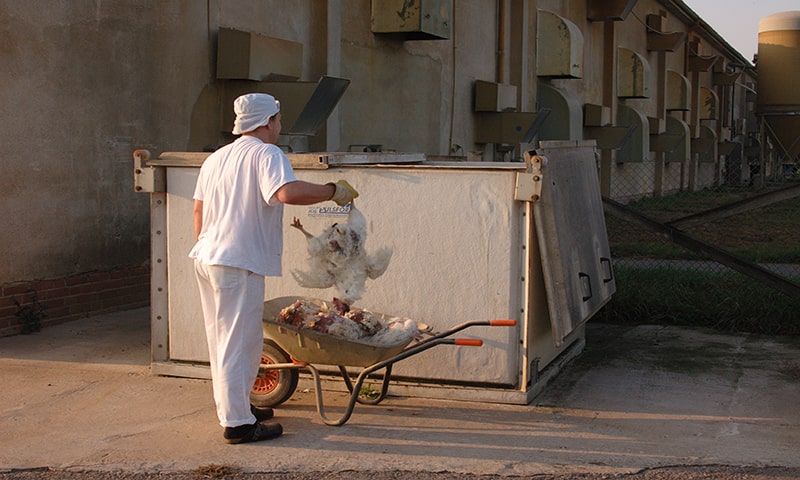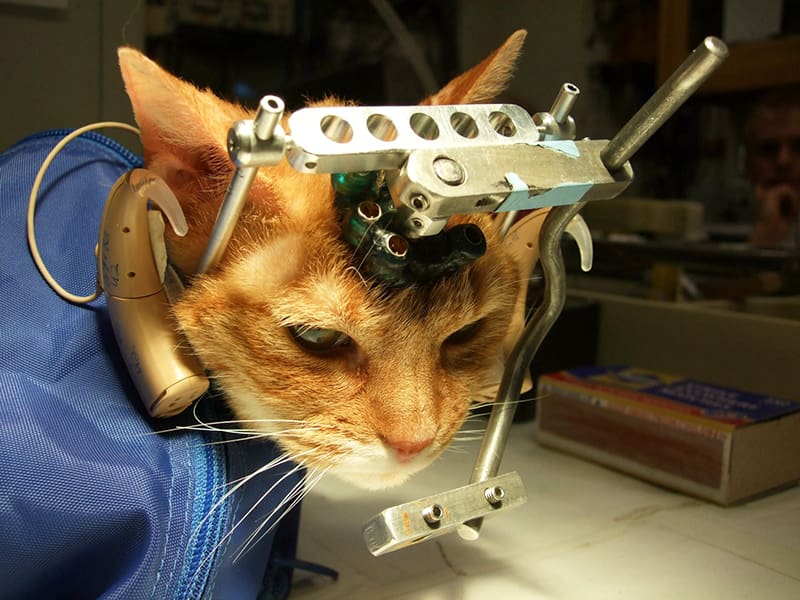What are psychological reasons for animal cruelty? Whether in factory farming, clothing production or simply in private households. The Animal mistreatment is a massive problem in our society that is much deeper than one might initially think. To combat animal suffering, it is therefore incredibly important to address the reasons for animal cruelty.
In this article, you will therefore learn about the psychological causes that lead perpetrators to torture animals. I'll also show you how we can all fight animal cruelty on a daily basis.
Here is another brief table of contents:
10 reasons for animal cruelty by humans

The connection between cruelty to animalsAbuse and (domestic) violence is now known to the jurisdiction and some states have passed so-called cross-reporting laws in order to identify and combat the causes at an early stage. According to these laws, human doctors and veterinarians are obliged to report possible abuse of humans or animals, the report then also goes out to the social services.
In the following, I will now introduce you to the typical, psychological reasons for animal cruelty.
1. monetary drive
Factory Farming and its cruelty is probably known to everyone. In the course of economic interests, animals are crammed into the smallest space and vegetate in their own feces. The company wants to make profit, the immediate employee usually acts according to instructions. Often he is not even aware that the animals are being tortured and he accepts this as a natural part of the job for which he is paid.
It is a sad fact that animals are mistreated in the course of manufacturing products in the food, clothing, and entertainment industries. Fortunately, more and more people are realizing the injustice that is happening there.
Tip: Do you hold Animal husbandry in the zoo still for contemporary? Form your own opinion with the help of the linked article.
2. personal retaliation
Especially with impulsive people, the reason for animal cruelty is often personal retaliation against another person, such as the ex-girlfriend or parents. A common pattern here is that the perpetrator feels powerless against the actual person, and these pent-up aggressions are then taken out on the animal.
3. sexual personality disorder
Some people become sexually aroused by torturing animals and then also abuse the animals. In psychology, this term is defined as zoophilia, colloquially is also often spoken of bestiality. There are always people who claim to live in a partnership with the animal and thus justify the abuse, since the sex is supposedly consensual. However, this is never the case. Animals are completely at the mercy of humans during the sexual act. They cannot defend themselves without any consequences. For a long time zoophilia was in a legal gray area, only since the amendment of the Animal Protection Act in 2013 zoophilia is clearly illegal.
4. neglect of pets
Law enforcement officers responding to animal neglect cases often find various forms of abusive behavior, such as neglect of children or elderly people in the same household. This is especially true of so-called "hoarding" of animals, in which a person takes in many more animals than can be cared for and becomes blind to the suffering of animals and people. In particular, hoarding cats is a common example of this.
5. sadistic personality tendency
Why do people mistreat animals? The cruelty to animals does not always have to have a psychological cause in childhood, the tendency to sadism can also simply be genetically predisposed. This is also correspondingly difficult to treat, people with a strong sadistic personality tendency is usually impossible to control it in the long term, here often only the penal system helps.
6. animal testing

In the name of science, animals are deliberately infected with disease, subjected to massive psychological stress, mutilated, irradiated, burned and killed. Animal testing are mostly carried out by pharmaceutical and cosmetics companies, but universities and research institutions also experiment with animals.
7. control from other people
Cases have also been documented where violence to animals is used to intimidate, coerce, or silence women or children about domestic violence. Again and again, this is one of many reasons for animal cruelty in our society.
8. animal phobia
Some people also torture animals out of fear. This can result from having had bad experiences with animals in the past (e.g. the perpetrator was attacked by a dog as a child), but it can also occur spontaneously like any phobia or be connected with certain imprints from childhood.
9. lack of educational skills
Many people simply have no educational skills when it comes to dealing with animals. Animals are brutally beaten and kicked, all the worse if this also serves in the end for entertainment purposes, such as in the circus.
10. thrill
In some cases of animal cruelty, the animal is not even the direct focus, but it only serves the perpetrator to generate a thrill or is part of a test of courage. This can be the case, for example, when perpetrators sneak onto farms at night to abuse horses or cows.
Why do humans mistreat animals? Can you think of any other reasons for animal cruelty? Then feel free to leave a comment below this article.
State of research: This is what makes people cruel to animals

Why do humans mistreat animals? Research has always evolved in this regard. In the 1970s, a new method for analyzing the behavior of offenders emerged in American criminal research: At "Behavioural profiling. psychological files are specifically created to find commonalities in the behavior patterns of the perpetrators. Incidentally, this method later gave rise to psychotherapy to treat psychological disorders and abnormalities.
The FBI, lead developer of the new method, discovered that there was one striking commonality between murderers and rapists: most had tortured animals in her childhood. The term "intentional animal torture and cruelty" (IATC) was coined to describe this behavior. Further research found that about one-third to one-half of all sex offenders had abused animals in childhood or adolescence. So there is a significant connection. But why is animal cruelty in childhood related to a later propensity to commit violent and sexual offenses?
Like many other forms of Violence is committed against animals by people who feel powerless or unnoticed or exposed to control by others. The connection has been studied in more detail by psychological research in the last 25 years and it was found that animal cruelty in childhood is often related to abuse, mistreatment or neglect by parents. Since then, animal cruelty has also been considered one of the most important "warning signs" in relation to later tendencies toward violence and abuse. In practice, animal cruelty is often an indicator of psychological disorders that can soon harm not only animals but also people.
How can the psychological reasons for animal cruelty be addressed?
So the psychological reasons for animal cruelty are many and even if it seems hard to accept: People who torture animals are often themselves victims of their circumstances. Does that excuse their behavior, or is it a reason to overlook it? Absolutely not!
On the contrary: To get to the root of the problem, it is important not only to be vigilant against animal cruelty per se, but also to be vigilant against the abuse and neglect of children. Because these favor animal cruelty in itself and are of course in themselves inexcusable crimes.
Families or living arrangements suspected of these crimes must also be monitored and, if in doubt, always reported to the police or youth welfare office. Cries of pain of children from the neighboring apartment, bruises on arms and body, all this can also Child welfare endangerment indicate.
As an outsider, you are often unsure how best to behave. After all, you don't want to intrude on the privacy of a foreign family. For this purpose, the Youth Welfare Office also offers non-binding, anonymous consultations on how best to proceed in the relevant situation. You can find the phone number if you type "Jugendamt + the name of your city" into the sustainable search engine of your choice. In any case, it is important that you take action and always talk to an expert when in doubt!
Make a daily statement against animal cruelty

Why do people abuse animals? As complex as our psychology may be, the math in the fight against animal cruelty is relatively simple: if there are fewer children exposed to abuse or neglect by parents, as a result, fewer animals will be tortured and mistreated. In addition, each one of us has learned a lot from being a own consumer behavior and Open eyes and ears Everyday life every day the chance, Help animals. This can be the renunciation of pork or cow's milk - and also the reporting of animal cruelty to the responsible veterinary office.
I can recommend these further articles to you:
Do you have questions about the psychological reasons for animal cruelty? Then feel free to write me a comment.
Best regards,

PS: In the animal welfare blog you will find a lot more information about the animal world. Learn, for example, how you can Garden design bird friendly simply by following your heart.
References:
C. Hilscher: Tierquälerei, Tiermisshandlung (Psychology), available at https://t1p.de/llz7. [24.03.2020].
Mark D. Griffiths (2016): The Psychology of Animal Torture, available at https://t1p.de/93dx. [30.03.2020].
E. Alleyne, University of Kent (2017): The Psychology of Animal Cruelty: An Introduction to the Special Issue, available at https://t1p.de/qw1x. [30.03.2020].
PETA Deutschland e.V.: Sodomy, Zoophilia or the Sexual Abuse of Animals (as of May 2019), available at https://www.peta.de/sodomie-zoophilie. [30.03.2020].




